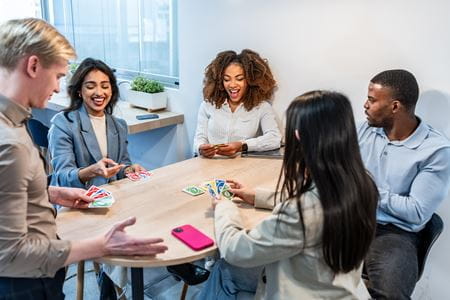As kids, playing is a part of everyday life. Whether that means going to the park, running around outside or spending time with toys in the living room. However, somewhere between being a child and growing into an adult, making time to play can begin to take a backseat.
Brian K. Nichelson, PhD, a psychologist in the IU School of Medicine’s Department of Mental Health Services, said play is really the “work” of childhood.
“It is critical for children to have opportunities to play in order to develop themselves neurologically and physically,” Nichelson said. “It seems that we may be born with some rudimentary ‘play circuits’ in our brain, which develop more as we engage in play activities."
Nichelson said activities like playing pretend encourage children to flex their creativity and exploring the school playground helps them build motor skills. But “playing” does not always mean bringing out toys or swinging on the monkey bars, it can also mean grabbing the UNO cards, dusting off the chess board or throwing a frisbee. As life gets busier and fills up with chores and other important tasks, Nichelson said adults can — and should — still make time to get back to the things that once brought so much joy.
Question: Why do you think play is gradually de-prioritized as we get older? What factors contribute to that phenomenon?
Brian K. Nichelson: It is common for adults to grow out of some of their play activities. This is unfortunate since play continues to be helpful in allowing one to be healthy mentally and physically as they grow older. I feel that it may be a societal pressure that tells us to "grow up and not be so childish." People become focused on work as their primary activity and sometimes forget about more simple activities such as play that can be very rewarding. It is important for adults to get back in touch with some of the "childlike" parts of themselves.
Q: How does play benefit adults specifically?
Nichelson: Play benefits adults in many ways. It can provide an excellent stress management strategy, which contributes to overall mental health. It can also be utilized as a part of behavioral therapy to help keep people who are depressed or anxious more activated and motivated toward activities that might interest them.
There are several activities that adults can participate in, such as sports and games, that may be beneficial to their overall physical health. Sometimes adults will shut down creative aspects of their personality as they become busier with work and other obligations.
I generally suggest that my patients try to get back in touch with creative aspects of self. We talk about engaging in past activities (art, music, crafts) or developing new activities or hobbies. Some people enjoy play in which they participate in a more social way. Playing sports activities, video games with others, or trivia games can be excellent outlets to connect socially but also allow for the "play mentality.”
Q: What are some examples of adult play, and how would you suggest adults find activities they’d like?
Nichelson: Adult play can look like a number of things. We certainly see people participating in sports, games and creative activities of all sorts. Sometimes people involve themselves as leaders in groups and enjoy that as an outlet. Adults will sometimes restart activities that they have done in the past or develop new ones.
I usually encourage people to become creative about different ideas. Sometimes it's helpful to look at lists of activities online or lists of hobbies. Most adults probably had some type of hobby as a child. They could certainly recreate some of those activities. I think it's important to find toys from the past, if that is possible. Just simply looking at those or thinking about those past activities can often trigger thoughts about new ideas for play.
Q: Is there a connection between what activities we used to enjoy as children and our work or recreational pastimes as adults?
Nichelson: Adults can definitely reconnect with previous activities from childhood. I have had many patients who were able to reconnect with a past activity and actually use that as a work activity. I had a patient once who had learned carpentry and furniture making as a hobby from his father and grandfather when he was a child. He went on to do this as a pastime but then began to find people in his life who wanted or needed furniture made and liked what he did. He was able to turn this into a fairly successful part-time business. Other creative activities can sometimes lend themselves to play activities that may also serve an additional purpose of developing extra income or lead to a job in retirement. The real issue is to help adults get back in touch with those childhood activities that they once enjoyed and may be able to restart and continue throughout their life.
